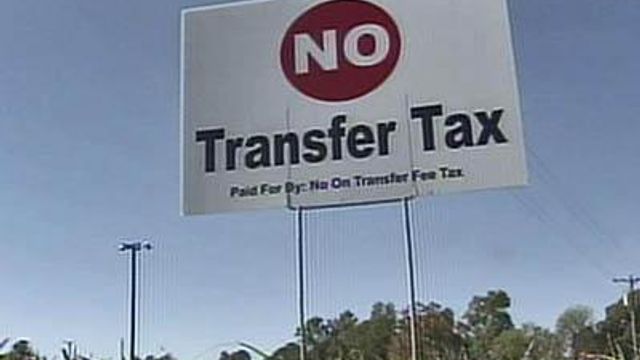Transfer Tax Idea Not Going Away After Defeat
A day after a controversial tax on home sales was soundly defeated in 16 North Carolina counties, state and local officials said Wednesday they would continue pursuing the tax to help pay for growth-related needs.
Posted — UpdatedThe land transfer tax was one of two local-option taxes that the General Assembly approved this year to help counties pay for infrastructure like new schools, improved roads and extended water and sewer lines. The tax amounts to 0.4 percent of a property's sales price, or $4 for every $1,000 in value.
The tax was put on the ballot in 16 counties this fall, and voters rejected the proposal by large margins in all of them. Unofficial results from five area counties considering a transfer tax – Chatham, Harnett, Hoke, Johnston and Moore – show between 70 and 93 percent of voters casting ballots against the tax.
"Upwards of 77 percent of the public (in the 16 counties) was opposed to this," said Tim Kent, executive vice president of the North Carolina Association of Realtors, which waged an unsuccessful battle in the General Assembly to keep the transfer tax from becoming an option for counties.
"People have sent a message that they absolutely, positively do not want to have a targeted tax on home ownership," Kent said.
House Minority Leader Paul Stam, a Wake County Republican, issued a statement Wednesday calling on lawmakers "to immediately repeal this misbegotten provision," saying it never should have been included in the state budget.
Chatham County officials have already said they plan to continue putting the tax up for votes, saying they need another option besides raising property taxes to pay for growth needs, including building six to eight schools in the next decade. Of the five area counties that voted Tuesday on a transfer tax, Chatham saw the strongest support, at 30 percent of voters.
"The needs that we have have not gone away from (Tuesday) to (Wednesday). In fact, those needs will increase over time," Chatham County Manager Charlie Horne said. "The Board of Commissioners, whoever is sitting, will have to struggle with how to finance with limited resources the needs that are apparent."
Officials in Wake and Durham counties also have floated the idea of putting a transfer tax on local ballots next year.
Todd McGee, communications director for the North Carolina Association of County Commissioners, said growth costs aren't going away soon, and counties will need to find some way of raising the money to pay for growth.
Forty-eight of North Carolina's 100 counties raised property taxes this year, McGee said, adding that counties cannot keep tapping that well every year to meet financial needs, especially as growth makes the needs more acute.
"We have got 3 million people coming our way over the next 20-some years. We have got to get ready for them, and that means more schools, more roads, more classes, more teachers," he said. "(Counties) need to be able to get ahead of this curve instead of constantly staying abreast with it or even falling behind."
Representatives of the home-building industry, which also lobbied against the transfer tax, said they create enough revenue to pay for infrastructure, but county officials aren't spending the money properly.
"There is plenty of money being generated. It is just a question of where it is being spent and prioritized," said Alastair MacAulay, director of political affairs for the North Carolina Homebuilders Association.
MacAulay suggested counties find cheaper ways to build schools and cut administrative expenses. He also said a sales tax would be a more palatable way to pay for growth.
Voters in five counties across the state, including Sampson County, on Tuesday approved a 0.25 percent local sales tax, the other optional tax that state lawmakers approved. Cumberland County voters defeated a sales tax proposal by a 52-48 percent margin.
McGee said counties will learn how to sell a transfer tax to local voters.
"Essentially what you're doing is asking citizens to tax themselves, and they're not going to do that unless you give them a good reason," McGee said. "It takes a while to build up a case like that."
But Kent, casting transfer tax opponents as "good guys," said the same groups would continue to fight the proposals at the polls.
"The good guys are going to continue to be involved in this issue and do battle as necessary," he said.
• Credits
Copyright 2024 by Capitol Broadcasting Company. All rights reserved. This material may not be published, broadcast, rewritten or redistributed.





